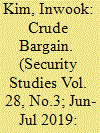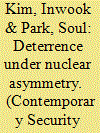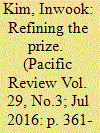|
|
|
Sort Order |
|
|
|
Items / Page
|
|
|
|
|
|
|
| Srl | Item |
| 1 |
ID:
168929


|
|
|
|
|
| Summary/Abstract |
Petro-alignment, a quid pro quo arrangement whereby great powers offer security in exchange for oil states’ friendly oil policies, is a widely used and yet undertheorized energy security strategy. One consequential aspect of this exchange is that great powers choose different levels of security commitment to keep oil producers friendly. With what criteria do great powers rank oil states? How do we conceptualize different types of petro-alignments? What exactly do great powers and oil producers exchange under each petro-alignment type? I posit that a mix of market power and geostrategic location determines the strategic value and vulnerability of individual client oil states, which then generates four corresponding types of petro-alignment—security guarantee, strategic alignment, strategic favor, and neglect. Two carefully selected case comparisons—Saudi Arabia and Kuwait in 1970–91, and Azerbaijan and Ecuador in 1990–2013—show how great powers created, utilized, and maintained petro-alignments under the unique logic of oil markets and across varying geopolitical settings. The findings have important implications on great powers’ grand strategies, strategic behaviors of oil states, and the role of oil in international security.
|
|
|
|
|
|
|
|
|
|
|
|
|
|
|
|
| 2 |
ID:
166610


|
|
|
|
|
| Summary/Abstract |
The 2016 decision to deploy Terminal High Altitude Area Defense (THAAD) to South Korea has generated multitude of intensely politicized issues and has proved highly controversial. This has made it challenging to alleviate, let alone clarify, points of analytical and policy tensions. We instead disaggregate and revisit two fundamental questions. One is whether THAAD could really defend South Korea from North Korean missiles. We challenge the conventional “qualified optimism” by giving analytical primacy to three countermeasures available to defeat THAAD–use of decoys, tumbling and spiral motion, and outnumbering. These countermeasures are relatively inexpensive to create but exceedingly difficult to offset. Second, we assess the optimal way to ensure South Korean national security against North Korean missiles. By examining the balance of capability and issues of credibility/commitment, we show that the U.S. extended deterrence by punishment remains plentiful and sufficiently credible even without enhancing the current defense capability.
|
|
|
|
|
|
|
|
|
|
|
|
|
|
|
|
| 3 |
ID:
147375


|
|
|
|
|
| Summary/Abstract |
What causes petro-aggression? Conventional wisdom maintains that the regime type of petrostates has significant effects on the likelihood that petrostates will launch revisionist militarized interstate disputes (MIDs). While domestic politics is an important factor that might explain the motivation and behavioral patterns of a petrostate, it says little about the international environment in which a petrostate decides to initiate conflicts. One significant factor that presents opportunities and constraints for petro-aggression is a great power alliance. In essence, the great power has strong incentives not to upset the relationship with its client petrostate ally for both strategic and economic reasons and, hence, tends not to oppose military adventurism by its ally. Consequently, the petrostate’s anticipation of great power inaction or even protection for its revisionist policy creates a moral hazard problem. Overall, by offering favorable circumstances, a great power alliance has a positive effect on petro-aggression. Although not without caveats, our large-n model and case study bear out this conclusion.
|
|
|
|
|
|
|
|
|
|
|
|
|
|
|
|
| 4 |
ID:
144905


|
|
|
|
|
| Summary/Abstract |
Since China became a net oil importer in 1993, oil refineries have played integral roles in China's quest for oil security. And yet, the capacity, security, and configurations of refineries were rarely featured in the discussions about China's oil policy. To fill this gap, this paper explains the basics of refinery economics and technology, and details the development in China's refining industry since the early 1990s. By taking refineries into consideration, it then revisits and reassesses the existing literature regarding the motives and drivers behind China's foreign oil policy, its effectiveness, and the political interactions between China and crude oil producers.
|
|
|
|
|
|
|
|
|
|
|
|
|
|
|
|
| 5 |
ID:
164312


|
|
|
|
|
| Summary/Abstract |
When do sanctions succeed in nuclear inhibition? Is there a generalizable framework to estimate sanction effectiveness against nuclear aspirants? Instead of relying on partial equilibrium analysis, we conceptualize sanctions as three sequential phases—imposition of economic pain, conversation to political pressure, and creation (or failure thereof) of zone of possible agreement (ZOPA). The effectiveness of each phase is subject to phase-specific contextual variables, an aggregation of which helps measure individual sanction's effectiveness, conduct cross-case comparison, and estimate one's replicability in other cases. To illustrate its analytical utility, we analyze the divergent sanction outcomes between Iran in 2012–2015 and North Korea in 2013–2017. Iran was economically more vulnerable and politically less resilient, and its bargaining position was closer to a ZOPA than North Korea was. Our analysis questions the utility of economic sanctions against North Korea and helps expand the discussion away from the policy obsession with the role of China. Theoretically, it rectifies an imbalance against qualitative and holistic approach in the sanction literature and contributes to discussions about nuclear inhibition strategies.
|
|
|
|
|
|
|
|
|
|
|
|
|
|
|
|
|
|
|
|
|